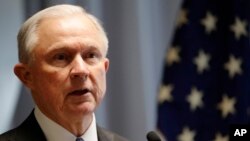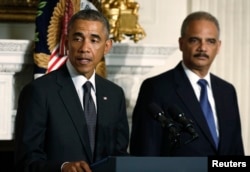U.S. Attorney General Jeff Sessions has directed federal prosecutors to seek the most serious charges possible against suspected offenders, a reversal of President Barack Obama's policies that could result in more convictions and much longer prison terms.
In a memo to the country's prosecutors Thursday, Sessions wrote, "This policy affirms our responsibility to enforce the law, is moral and just, and produces consistency."
War on drugs
At a speech Friday in Washington, Sessions said the order was needed to combat an increase in violence in some large cities and the nation's opioid epidemic. "If you want to collect a drug debt, you can't file a lawsuit in court. You collect it by the barrel of a gun," Sessions said.
The order had been expected from Sessions, a former prosecutor during the height of the U.S. crack cocaine epidemic, who vowed that combating violence and illegal drugs would be the Justice Department's top priority.
Sessions' policy memo directs prosecutors to "charge and pursue the most serious, readily provable offense." The memo acknowledges there will be cases in which "good judgment" will permit a prosecutor to bend that rule. Exceptions, however, would require approval from top supervisors.
The directive abolishes guidance by Sessions' Democratic predecessor, Eric Holder, who said prosecutors could in some cases omit drug quantities from charging documents so as to not generate long sentences. Holder's 2013 "Smart on Crime" policy initiative was aimed at encouraging shorter sentences for nonviolent drug offenders, thus freeing up resources to pursue more serious and violent criminals.
In a statement Friday, Holder said Sessions' policy is "dumb on crime" and will "take this nation back to a discredited past." Holder said Justice Department data showed last year that while the number of indictments carrying a mandatory minimum sentence declined since his policy was implemented, prosecutions of high-level drug defendants had increased.
Holder predicted Sessions' directive will be "substantively and financially ruinous" and will force the agency to revert to the days of spending "one third of its budget in incarcerating people, rather than preventing, detecting or investigating crime."
Some supporters of Obama-era policies, which eased federal prison overcrowding and contributed to a national reassessment of how drug criminals were prosecuted and sentenced, said Sessions' order will revive the worst aspects of the government's drug war.
"It looks like we're going to fill the prisons back up after finally getting the federal prison population down," said Kevin Ring, president of Families Against Mandatory Minimums. "The social and human costs will be much higher."
Sessions' directive counters a national trend to eliminate some of the most severe sentencing policies adopted during the 1980's era war on drugs. Many experts have maintained those laws resulted in offenders receiving very lengthy prison sentences when shorter terms would have been sufficient.
"The Justice Department's expected shift to prosecuting and incarcerating more offenders, including low-level drug offenders, is an ineffective way to protect public safety," Brett Tolman, a U.S. Attorney under President George W. Bush, said in a statement in response to the order.
"Decades of experience shows we cannot arrest and incarcerate our way out of America's drug problem," he said. "Instead, we must direct resources to treatment and to specifically combating violent crime. This will help law enforcement do our jobs better."
Obama-era policies
The Obama administration policy shift coincided with its clemency initiative that released convicts considered worthy of a second chance and U.S. Sentencing Commission changes that made tens of thousands of federal drug inmates eligible for early release. Together, those changes led to a sharp drop in the federal prison population, from 220,000 in 2013 to the current level of 190,000.
Nevertheless, some prosecutors felt constrained by Holder's 2013 directive and were concerned they would lose the ability to plea bargain without the latitude to pursue harsher punishments.






